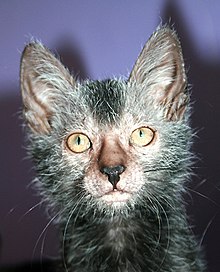| This article may require cleanup to meet Misplaced Pages's quality standards. The specific problem is: The article does not follow the Manual of Style. Please help improve this article if you can. (September 2024) (Learn how and when to remove this message) |
Breed of cat
| Lykoi | |
|---|---|
 | |
| Common nicknames | Werewolf cat, wolf cat |
| Origin | United States |
| Breed standards | |
| CFA | standard |
| TICA | standard |
| WCF | standard |
| GCCF | standard |
| Domestic cat (Felis catus) | |
The Lykoi (commonly called wolf cat or werewolf cat) is a breed of cat derived from a natural mutation causing a form of hypotrichia (e.g. congenital alopecia) found in domestic short-haired cats. The mutation has occurred in domestic cats over the last 20 years. DNA testing has been done by UC Davis to confirm that the cats do not carry the Sphynx/Devon Rex gene. The breed was developed by Brittney Gobble in Vonore, Tennessee.
The term Lykos (Greek: λύκος, romanized: lýkos, plural λύκοι, lýkoi; Ancient Greek: λῠ́κος, romanized: lúkos, plural λῠ́κοι, lúkoi) means 'wolf' in Greek.
Although commonly described as looking visually arresting, perhaps invoking horror films to some owners, the felines have sweet-natured personalities and appreciate human affection.
Characteristics

Lykoi vary from completely covered in hair to partially hairless. Lykoi may sometimes lose all of their hair, resulting in a Sphynx cat-like appearance, but this hair loss is only temporary. A unique characteristic of the cat breed is that the Lykoi sheds a lot when older, but regrows its hair later in life depending on the season. The missing coat of the Lykoi's face gives the breed a wolf-like appearance.
Lykoi are genetically distinct from the Canadian Sphynx cat. The hair coat is unique in appearance in that it resembles the coat of an opossum when mostly coated. Standards call for a roan coat (of any color, although black is most common), a wedge-shaped head, and a lithe body of solid weight without excessive bulk. Lykoi are said to be friendly and unchallenging in their behaviour. They display a high level of affection for their owners.
History of the cat breed
Two different sets of domestic short-hairs with the Lykoi gene were adopted from a rescue after being discovered in Virginia in 2010, by Patti Thomas, who co-founded and named the breed, and in 2011, a second pair were located in Tennessee, by Johnny Gobble.
The Lykoi is a naturally occurring gene in the feral cat population. The Lykoi breed was founded in 2011 by Johnny Gobble, Brittney Gobble, and Patti Thomas when two unrelated litters of kittens were presented to the founders as unique cats. The Gobbles did careful health evaluations to ensure that the cat's unusual appearance was not caused by sickness or disease. To prove that it was a gene, Johnny Gobble bred two of the unrelated cats to produce the first intentionally bred Lykoi. Since the mother to one litter was a black domestic, extensive outcrossing with short-haired black domestic cats began. With time, it was determined that the gene was recessive, and to continue to reduce genetic inbreeding, more outcrossing with the black domestic cats was done. There are still Lykoi cats born to the feral cat population, and sometimes they can be used in the breeding program. Once Championship status is reached, there should be enough outcrossing to ensure that inbreeding is minimal.
In The International Cat Association (TICA) registry, the Lykoi went before the board in 2012 and was passed to "Registration Only" status by unanimous consent. The breed is now recognized as a Championship Breed and were able to begin competing against other Championship breeds from May 2017, with TICA. Work is currently being done to expand the breeding program.
In The Cat Fanciers' Association (CFA), Lykoi of all colors are accepted and compete in Championship Breed beginning 2023–2024.
Health
A study published by The Japanese Journal of Veterinary Dermatology has found that a high percentage of hair follicle groups were affected by mild to severe lymphocytic perifollicular to mural folliculitis in all Lykoi cats. The same study had found that Lykoi cats did have an increased average sebaceous gland area per hair follicle group compared to Domestic Shorthair Cats, which were used as a control group. Other health concerns have not been linked to this breed.
References
- Buckley, Reuben M.; Gandolfi, Barbara; Creighton, Erica K.; Pyne, Connor A.; Bouhan, Delia M.; LeRoy, Michelle L.; Senter, David A.; Gobble, Johnny R.; Abitbol, Marie; Lyons, Leslie A.; 99 Lives Consortium (June 22, 2020). "Werewolf, There Wolf: Variants in Hairless Associated with Hypotrichia and Roaning in the Lykoi Cat Breed". Genes. 11 (6): 682. doi:10.3390/genes11060682. ISSN 2073-4425. PMC 7348984. PMID 32580512.
{{cite journal}}: CS1 maint: numeric names: authors list (link) - Gobble, Brittney. "Breed History / Recognition". Lykoi_VA. Atreyukatz Cattery. Archived from the original on October 2, 2023. Retrieved October 2, 2023.
- Svenska, Anneka (March 15, 2019). "The Wolf Cat - Lykoi". Animal Watch – via YouTube.
- Supan, Colleen. "Meet the Werewolf Cat: the Lykoi". CatChannel.com. Archived from the original on November 13, 2015. Retrieved November 11, 2015.
- "Lykoi cats have a DNA mutation that makes them look like werewolves". Tech Insider. Axel Springer SE. October 27, 2015. Retrieved November 11, 2015.
- Change, Max. "There's a Terrifying Breed of 'Werewolf Cats' That Act Like Dogs and Cost Up to $2,500". NextShark. Archived from the original on October 29, 2015.
- "Lykoi Breed". TICA.org. The International Cat Association. August 13, 2018. Retrieved July 31, 2019.
- "Lykoi". BeeblebroxSphynx.com. RockStarz and Beeblebrox Sphynx and Lykoi. Retrieved May 24, 2023.
- LeRoy, Michelle L.; Senter, David A.; Kim, Dae Young; Gandolfi, Barbara; Middleton, John R.; Trainor, Karen E.; Bouhan, Delia M.; Lyons, Leslie A. (2016). "リコイ猫の被毛と皮膚に関する臨床的および組織学的記述". 獣医臨床皮膚科. 22 (3): 179–191. doi:10.2736/jjvd.22.179.
External links
 Media related to Lykoi at Wikimedia Commons
Media related to Lykoi at Wikimedia Commons